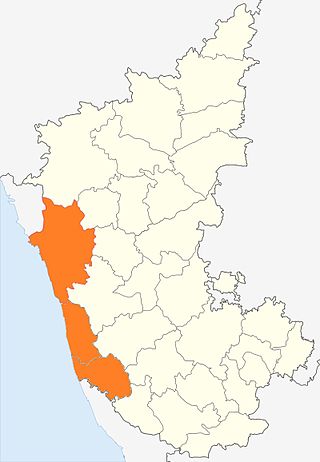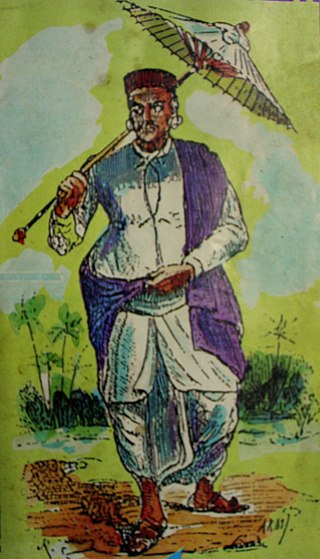Konkani may refer to:
Konkani may refer to:

The Konkan is a stretch of land by the western coast of India, bound by the river Daman Ganga at Damaon in the north, to Anjediva Island next to Karwar town in the south; with the Arabian Sea to the west and the Deccan plateau to the east. The hinterland east of the coast has numerous river valleys, riverine islands and the hilly slopes known as the Western Ghats; that lead up into the tablelands of the Deccan. The region has been recognised by name, since at least the time of Strabo in the third century CE. It had a thriving mercantile port with Arab tradesmen from the 10th century. The best-known islands of Konkan are Ilhas de Goa, the site of the Goa state's capital at Panjim; also, the Seven Islands of Bombay, on which lies Mumbai, the capital of Maharashtra and the headquarters of Konkan Division.

Kanara or Canara, also known as Karavali, is the historically significant stretch of land situated by the southwestern Konkan coast of India, alongside the Arabian Sea in the present-day Indian state of Karnataka. The subregion comprises three civil districts, namely: Uttara Kannada, Udupi, and Dakshina Kannada. Kasaragod was included prior to the States Reorganisation Act.

Konkani is an Indo-Aryan language spoken by the Konkani people, primarily in the Konkan region, along the western coast of India. It is one of the 22 scheduled languages mentioned in the Indian Constitution, and the official language of the Indian state of Goa. It is also spoken in Karnataka, Maharashtra, Kerala, Gujarat as well as Damaon, Diu & Silvassa.

Saurashtra is an Indo-Aryan language spoken primarily by the Saurashtrians of Southern India who migrated from the Lata region of present-day Gujarat to south of Vindhyas in the Middle Ages.

Karwar is a seaside city and headquarters of Uttara Kannada district lying at the mouth of Kali river in the Karnataka state of India. Karwar is a popular place known for the INS Kadamba.
Kamat or Kamath is a surname from Goa, Maharashtra and coastal Karnataka in India. It is found among Hindus of the Goud Saraswat Brahmin, Saraswat and Rajapur Saraswat Brahmin communities following Madhva Sampradaya of either Gokarna Matha or Kashi Matha.
The Konkani people are an Indo-Aryan ethnolinguistic group native to the Konkan region of the Indian subcontinent. They speak various dialects of the Konkani language. Following the Konkani language agitation, Konkani became the premier official language of Goa state, while Marathi remains as the associate official language of Goa. Konkani is also spoken by populations in Karnataka, Maharashtra, Damaon, Kerala, & Gujarat. A large percentage of Konkani people are bilingual.

Konkan division is one of the six administrative divisions of Maharashtra state in India. It comprises the central portions of the Konkani region excluding Goa and Damaon, which were absorbed into Maharashtra owing to the States Reorganisation of India. Konkan division is the western section of present-day Maharashtra, alongside the west coast of India. The two districts of the state capital of Mumbai (Bombay) also fall into this division.

The Daivadnya,, is a community from Goa and Karnataka, who claim to have descended from Vishwakarma. Although they claim themselves to be Brahmin, but these claims are not accepted by others including local Brahmin castes. They are native to the Konkan and are mainly found in the states of Goa and Damaon, Canara, coastal Maharashtra, and Kerala. Daivadnyas in the state of Karnataka are classified by National Commission for Backward Classes as an Other Backward Class.
The Marathi—Konkani languages are the mainland Southern Indo-Aryan languages, spoken in Maharashtra and the Konkan region of India. The other branch of Southern Indo-Aryan languages is called Insular Indic languages, which are spoken in Insular South Asia.

Christianity is a minority religion in Maharashtra, a state of India. Approximately 79.8% of the population of Maharashtra are Hindus, with Christian adherents being 1.0% of the population. The Roman Catholic archdiocese whose seat is in Maharashtra is the Roman Catholic Archdiocese of Bombay. There are two different Christian ethnic communities in Maharashtra: the Bombay East Indians, who are predominantly Roman Catholic, and the Marathi Christians, who are predominantly Protestant with a small Roman Catholic population.

Kudaldeshkar Gaud Brahmin is a Brahmin sub-caste from the western coast of India, residing in the Konkan division of Maharashtra and Goa. They also known as Kudaldeshkar Aadya Gaud Brahmin, Kudaldeshkar and sometimes Kudalkar Brahmins. They speak Marathi, and the Malwani dialect of Konkani.
Karnataka is a state in the southern part of India. It was created on 1 November 1956, with the passing of the States Reorganisation Act. Karnataka is bordered by the Arabian Sea to the west, Goa to the north-west, Maharashtra to the north, Telangana and Andhra Pradesh to the east, Tamil Nadu to the south-east, and Kerala to the south-west. The state covers an area of 74,122 sq mi (191,976 km2), or 5.83% of the total geographical area of India. It comprises 30 districts. Kannada is the official language of Karnataka and as per the 2011 census is the mother tongue of 66.5% of the population. Various ethnic groups with origins in other parts of India have unique customs and use languages at home other than Kannada, adding to the cultural diversity of the state. Significant linguistic minorities in the state in 2011 included speakers of Urdu (10.8%), Telugu (5.8%), Tamil (3.5%), Marathi (3.4%), Hindi (3.2%), Tulu (2.6%), Konkani (1.3%) and Malayalam (1.3%).

Konkani in the Roman script, commonly known as Roman Konkani or Romi Konknni refers to the writing of the Konkani language in the Roman script. While Konkani is written in five different scripts altogether, Roman Konkani is widely used. Roman Konkani is known to be the oldest preserved and protected literary tradition beginning from the 16th century AD.

Goykānaḍī or Kandavī is a Brahmic script that was once used in the territory of Goa to write Konkani and sometimes Marathi in the Konkan coast. Similarly, it was used by the trading Saraswat and Daivajna families along with the Modi script to maintain their accounts.

Canarese Konkani are a set of dialects spoken by minority Konkani people of the Canara sub-region of Karnataka, and also in Kassergode of Kerala that was part of South Canara.
Konkani is a southern Indo-Aryan language belonging to the Indo-European family of languages spoken in the Konkan coastal region of India. It has approximately 3.6 million speakers.
The Konkani language agitations were a series of protests in India, concerning the uncertain future of the Konkani language. They were held by Goans in the former territory of Goa, Daman and Diu; then under the administration of the Maharashtrawadi Gomantak Party (MGP). The protests involved citizen journalism, student activism & political demonstrations. The civil unrest ceased when premier official status for Konkani in the Devnagari script was granted. Marathi was declared an associate official language of Goa.
Malvani may refer to:

Maharashtri Konkani or Konkan Marathi, is a group of Konkanic dialects spoken in the Konkan division of the Konkan region. George Abraham Grierson, a British Indian linguist of the colonial era referred to these dialects as the Konkan Standard of Marathi in order to differentiate it inside the Konkani language group.